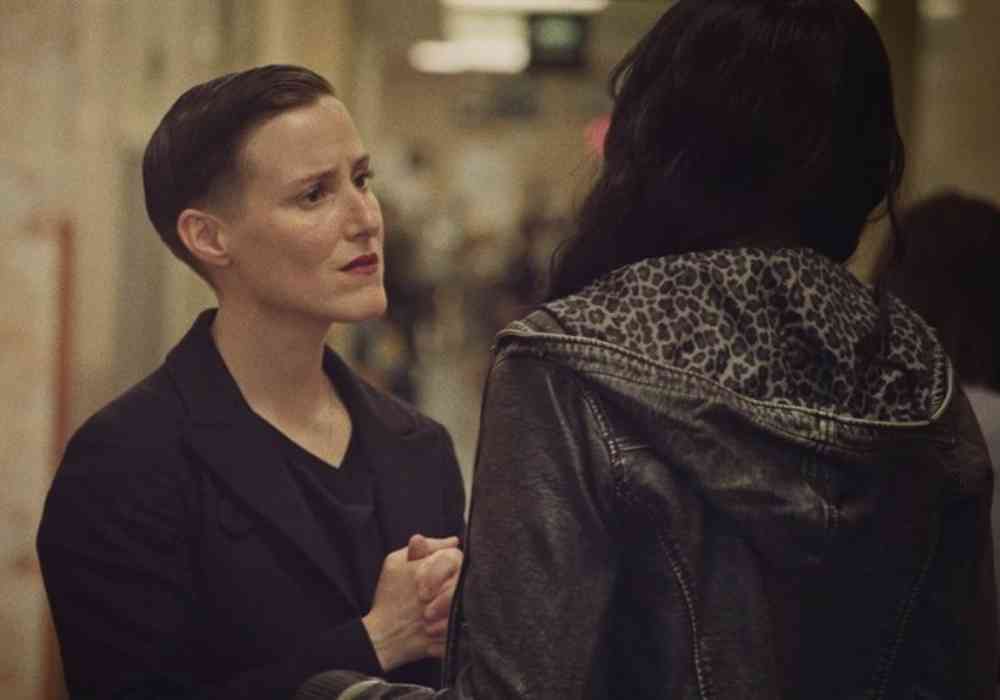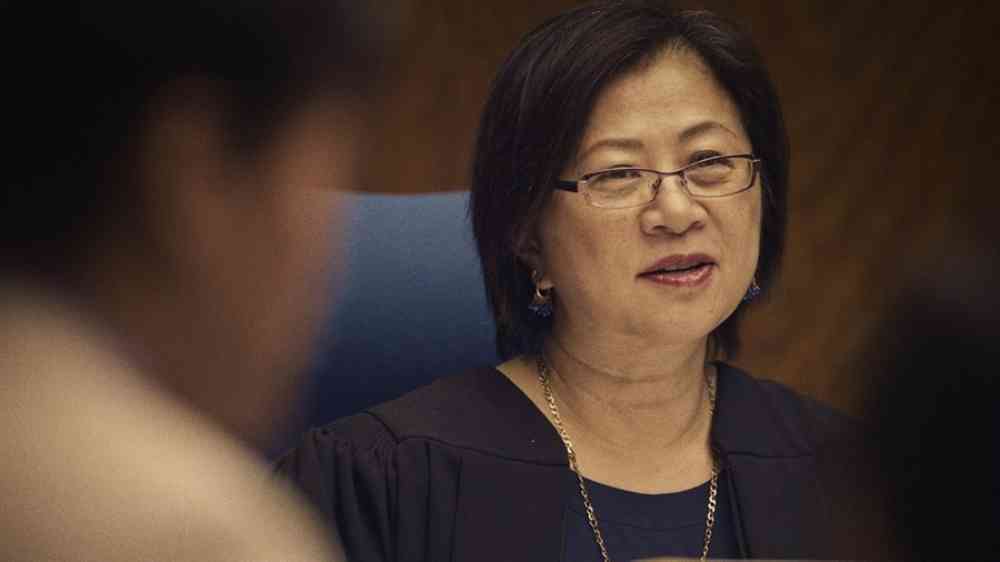Director Stephanie Wang-Breal on portraying sex workers with dignity in her documentary Blowin’ Up.

‘Blowin’ up’ is the term that sex worker Kandie uses to describe leaving her abusive pimp in Stephanie Wang-Breal’s documentary Blowin’ Up. It’s a term of empowerment that grants sex workers agency and economic sustainability. Leaving an abusive environment is also often a first step out of survival sex work and towards other forms of steady employment. Yet to many women, “blowin’ up” is not an option. Because the abusive men they work for steal their identification and social security card, they lack the resources necessary to leave and to find other forms of employment. Wang-Breal successfully empowers these vulnerable sex workers with her documentary, providing them with a medium to share their stories.
Blowin’ Up chronicles the daily routine of a Queens courtroom, where a majority of human trafficking and prostitution cases in New York City are tried. Easy targets to the police, such as vulnerable street sex workers and new Asian immigrants working in massage parlors, come to the courtroom every day — yet presiding Judge Toko Serita has no interest in treating these women as criminals. Rather, her methods represent a unique and rare instance of sex work being essentially decriminalised. The women who visit Judge Serita’s courtroom are enrolled in a mentorship program which, if they stick to it, ensures that their charges are cleared from their record within six months. At no moment during this process do these young women and girls have to admit guilt or protest charges.
At a time where the #MeToo and #TimesUp movements are gathering steam, the women within this courtroom are hard working heroes of social justice in their own rights. Whether they support or condemn sex work, they work together, using concrete action to help these women. I talked to Wang-Breal about capturing this female-dominated environment and about the emotional impact of her fly-on-the-wall narrative style.
Seventh Row (7R): How did you gain access to this courtroom?
Stephanie Wang-Breal: I read about this court in an article in The New York Times in 2014. It involved two populations of women that I’m deeply invested in: Asian immigrants, and young women and girls coming from the foster care system. These two populations have disparate backgrounds — and yet so much in common when you examine their life stories and the issues that brought them into this line of work.
I went to the court and all the people there — from Court Officer Stacey to the District Attorney, Kim Affonti, and Eliza [from GEMS] — were such different kinds of women from all walks of life.
I got an introduction to Judge Serita, and I said, “I make these really nuanced portrait films about subject matter that I don’t know anything about when I start, but I do the best to represent what I learned.” Judge Serita said, “That sounds like a lovely idea, and I think you’re the right person to do it, but do I have to be in it?” I said, “I think of you as the conductor of an orchestra. There’s lots of chaos in the hallways, but in the front, there’s order.” She said, “Let me think about it, because there’s a lot at stake here, not just for me but for the women.” After, we kept coming back and talking. We slowly earned people’s respect: they realised we were not here just to grab a story and then leave. With every film I make, I try to take audiences on the journey that I go through. I am dropped into this world, and I’m trying to figure things out.
7R: How long did you spend in the courtroom?
Stephanie Wang-Breal: We spent about two years. It wasn’t every day. At each court date, if one or two women let us film them, that was a good day. I would make an announcement at the beginning, in English and Mandarin, to say, “I’m an independent filmmaker making an independent documentary about this court. I want everyone to know that you have a choice whether or not you want to participate. We understand that most of you will not.”
7R: How did you create a sense of ease and capture a more intimate environment?
Stephanie Wang-Breal: We stayed in the background, which is not typical docu-style filmmaking. I did not want to have cameras in people’s faces. I wanted to make people feel like we were dropped in and given access to these whisperings, these conversations where there is so much confusion and misunderstanding in a space that needs clarification. We used different lenses to give them the space to just be.

7R: What kinds of conversations did you have with the DP about this fly-on-the-wall style of filmmaking?
Stephanie Wang-Breal: One thing I said from the very beginning was, “I’m a little bit nervous about making a film about prostitution. It’s been done so many times before, and it has been done so poorly.” I told my cinematographer I wanted to play with the lights in the massage parlours and the lights of the red light district. Even with the opening title design, I wanted to have this feeling that lights are blinking, but also the reflection of light — the reflection of what we see and what we don’t see. What do we see in these women and what don’t we see in these women?
These women are invisible in New York City, yet they live down the block from us. The whole existence of this court is invisible. There’s the #MeToo movement. There’s the #TimesUp movement. But these women have been doing this work this whole time. They are working against gender bias, discrimination, and assault.
[clickToTweet tweet=”‘These women are invisible in New York City, yet they live down the block from us.'” quote=”‘These women are invisible in New York City, yet they live down the block from us.'”]
Also, I really liked this courtroom as opposed to the other courtroom, because it was beautiful. The others were so ugly and had terrible sound. From a production design standpoint, the architecture was perfect for filming. The overhead light panel, the wood walls, the black marble hallway, and the white marble hallway. It was very exciting to me from a visual perspective.
I knew that all these women wouldn’t let us film them, so I asked myself: how can I frame them in a way that makes them feel whole? In a lot of films where the filmmakers can’t film the women, they show just bits and pieces. I wanted to feel the whole and to get across the intimacy of these women. She’s a whole person, and she has this whole experience.
Interested in interviews with doc filmmakers? Pick up our Documentary Masters ebook now, and read what some of the best in the business have to say about their craft.
7R: You highlight the GEMS program. What does it stand for, and how does it help these young women?
Stephanie Wang-Breal: Girls Educational and Mentorship Services is what GEMS stands for. They do a lot of things. If you don’t have your ID, they take you down to the office that handles that and help you get your birth certificate again and your Social Security card. They do a lot of educational initiatives. What these girls need is economic empowerment and economic training programs. This is about gaining access to those things.
People who are doing well in life ask me, “What can I do to help?” I say, “If you have an internship program, a lot of these girls would love to do that. But you have to know, they aren’t going to show up on time for the first two weeks, maybe. They’ve been working in this world that doesn’t have set hours. You cannot have the same expectations of them as you would have of a recent college grad. They haven’t grown up with those rules and that structure in their life.” You have to have a training yourselves to understand and judge women and girls coming out of this life.
[clickToTweet tweet=”‘I knew that all these women wouldn’t let us film them, so I asked myself: how can I frame them in a way that makes them feel whole?'” quote=”‘I knew that all these women wouldn’t let us film them, so I asked myself: how can I frame them in a way that makes them feel whole?'”]
7R: A bill that was recently passed in the US will crack down on personal ads on websites like Craigslist or Backpage. This has a lot of sex workers worried about their safety. What is your position on the new laws?
Stephanie Wang-Breal: The spectrum of sex workers is large. Who this law helps or hinders is large. This courtroom is not prosecuting white, highly paid escort workers. I have no problem with sex work if that is how you pay your bills or take care of your children. I loved making this film because it changed my idea of sex work.
For those women who do use Backpage for their own agency, who are empowered making their money, and they rely on that, then that does suck. There’s also this other spectrum of young children who are being exploited off of Backpage. How do we help these women, but how do we help the ones that don’t have the agency?
I think it’s so complicated, and I love it because it’s so complicated.
[clickToTweet tweet=”‘You have to have a training yourselves to understand and judge women and girls coming out of this life.'” quote=”‘You have to have a training yourselves to understand and judge women and girls coming out of this life.'”]
7R: There is one scene in which the room is mainly filled with women working together with comradery and empathy through this complex issue. Was this part of the overall message you wanted to convey to a broader audience?
Stephanie Wang-Breal: Some of the feedback that I have gotten from some of the audience members has been, “You don’t see women like this on the big screen, and you rarely see a film with only women in it.” It’s the Bechdel test; these women on screen are not trying to get a man. They’re doing something so much bigger than the policy that we hear about in Washington, DC. It is one of my proudest accomplishments, that I was able to share that with the world. Women love this movie. It has moved women from all walks of life. They want to see people like this doing this work.
As a playwright (Red/Rouge), Laura Anne Harris has addressed sex work in her plays, which has made her interviews with filmmakers addressing the topic particularly fruitful. She talked to Canadian director Hannah Donegan about Sugar Sisters, in which she and her sisters decided to become Sugar Babies with rich male benefactors. Elsewhere at 7R, in the realm of fiction, we talked to Anne Émond about her Nelly Arcand Biopic, Nelly, and to Sean Baker about Tangerine, in which its transgender protagonist is involved in sex work.

